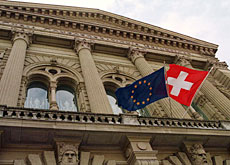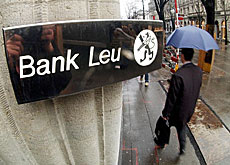First savings tax instalment may disappoint

The first instalment of a withholding tax levied on the Swiss-held savings of European Union residents may not match expectations, a tax expert told swissinfo.
Swiss banks must hand the cash over to the federal authorities by the end of March, which will then be distributed to account holders’ home countries under the terms of a Swiss-EU treaty.
The treaty, which came into effect on July 1 last year, compels Swiss banks to collect a 15 per cent withholding tax on the savings interest earnings of EU resident customers unless they voluntarily disclose account details to their home country.
It was designed to stop people avoiding taxes in their resident country. But KPMG tax expert Roland Reding has seen evidence that much of the new tax has escaped through loopholes exploited by banks.
“I have seen [banking] provisions for this tax and I was always surprised the figures were so small. The payments to the EU may be far below expectations,” he told swissinfo.
Estimates of Switzerland’s withholding tax contribution vary between SFr120-200 million ($91-152 million) for the period between July 1 to December 31, 2005. But the figure is hard to guess in advance without knowing how many account holders have opted for voluntary disclosure.
Increased activity
The new measures only apply to individual savings interest (not dividends) and bonds issued after March 2001, allowing account holders to manoeuvre assets into new financial products that are designed to avoid the narrow terms of the treaty.
Reding believes this activity will only increase when the tax rate rises to 20 per cent in 2008 and 35 per cent in 2011.
“It is very easy to invest in products or structures that are beyond the scope of withholding tax. You only have to click on the homepages of banks to see what these are,” he said.
“I predict the level of tax will go down again next year as customers have time to make the necessary adjustments. By 2008 there could be so many structures in place that there will be hardly any investments in old products.
“It will be difficult for the EU to change the directive substantially as this needs the agreement of the 25 member states and Switzerland.”
Banking on it
Credit Suisse, Switzerland’s second largest bank, is confident that these new products will stop customers taking their money abroad.
“Our clients appreciate the traditional strengths of the Swiss financial sector [such as] the tradition of private banking, international diversification, innovative products and services, and the security of the financial sector as a whole,” Credit Suisse spokeswoman Gabriela Cotti Musio told swissinfo.
“Furthermore there are many products on the market that are not affected by the retention, for example equities and insurance products.”
swissinfo, Matthew Allen
The savings tax accord is part of the second set of bilateral agreements between Switzerland and the EU that came into force in July last year.
Austria, Luxembourg and Belgium have also opted to introduce withholding tax in preference to an automatic information exchange.
Banking analysts have previously estimated the cost to banks of implementing the accord to be SFr100-300 million.
Under the terms of the savings tax accord, Swiss banks are obliged to collect a so-called “withholding tax” on the interest earned by account holders who live in the European Union.
Account holders can avoid the tax if they make a voluntary declaration to their home tax authorities.
The tax rate is currently set at 15% but will rise to 35% by 2011.
The treaty states that 75% of the proceeds will be passed on to the EU member state concerned, with the remainder going to the Swiss federal coffers and the cantons.

In compliance with the JTI standards
More: SWI swissinfo.ch certified by the Journalism Trust Initiative











You can find an overview of ongoing debates with our journalists here . Please join us!
If you want to start a conversation about a topic raised in this article or want to report factual errors, email us at english@swissinfo.ch.